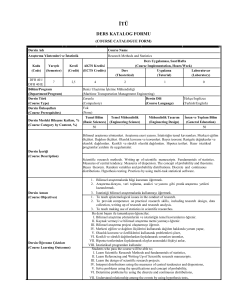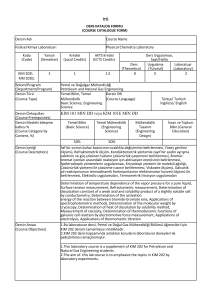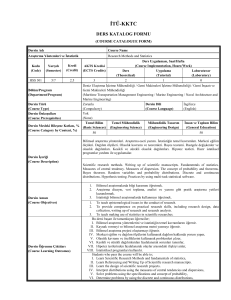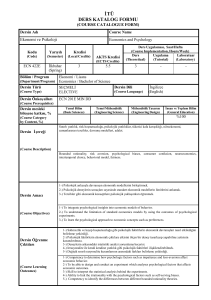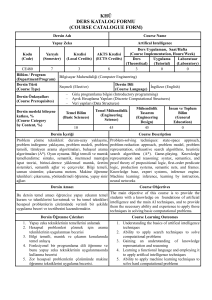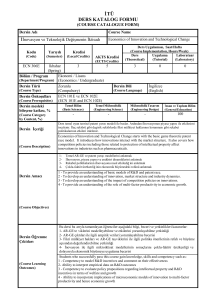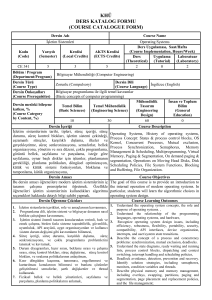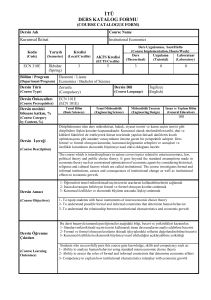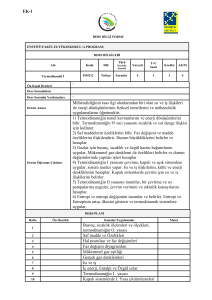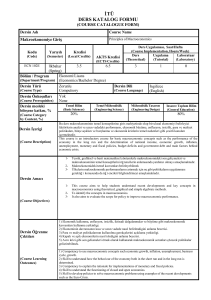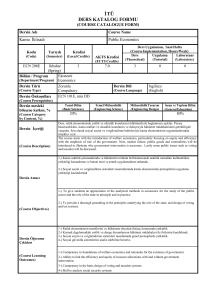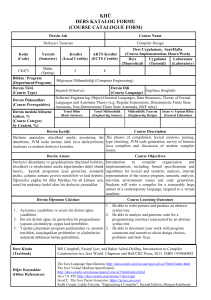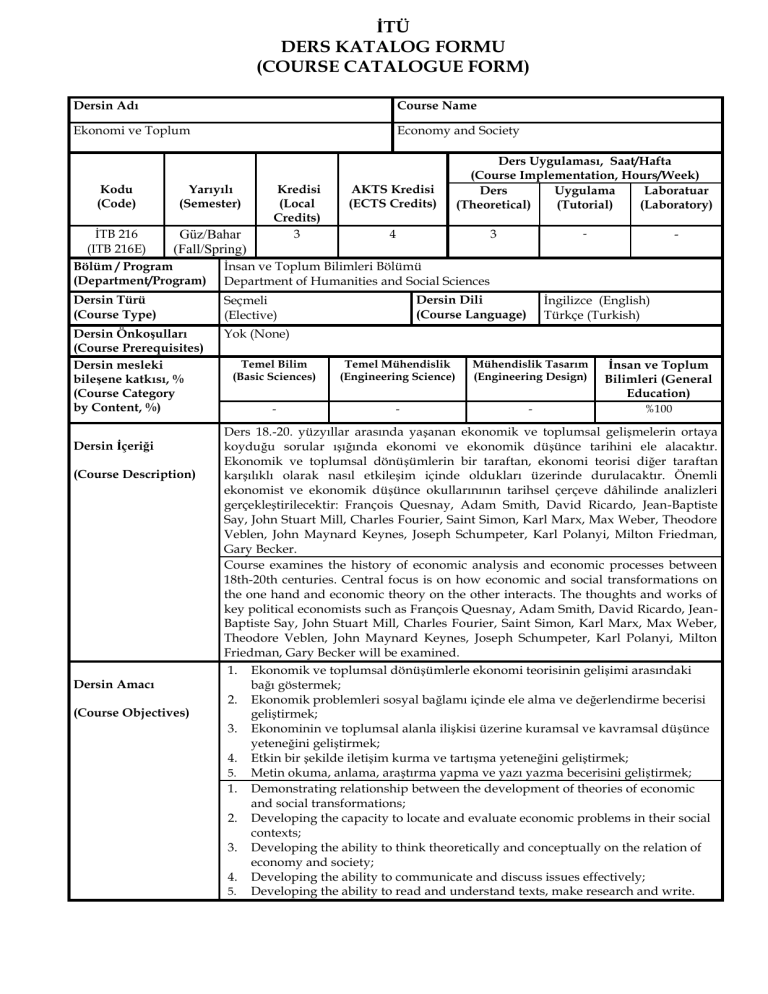
İTÜ
DERS KATALOG FORMU
(COURSE CATALOGUE FORM)
Dersin Adı
Course Name
Ekonomi ve Toplum
Economy and Society
Kodu
(Code)
Yarıyılı
(Semester)
Kredisi
(Local
Credits)
3
AKTS Kredisi
(ECTS Credits)
Ders Uygulaması, Saat/Hafta
(Course Implementation, Hours/Week)
Ders
Uygulama
Laboratuar
(Theoretical)
(Tutorial)
(Laboratory)
İTB 216
4
3
Güz/Bahar
(ITB 216E)
(Fall/Spring)
Bölüm / Program
İnsan ve Toplum Bilimleri Bölümü
(Department/Program) Department of Humanities and Social Sciences
Dersin Türü
(Course Type)
Seçmeli
(Elective)
Dersin Önkoşulları
(Course Prerequisites)
Dersin mesleki
bileşene katkısı, %
(Course Category
by Content, %)
Yok (None)
Dersin İçeriği
(Course Description)
Dersin Amacı
(Course Objectives)
-
Dersin Dili
(Course Language)
-
İngilizce (English)
Türkçe (Turkish)
Temel Bilim
(Basic Sciences)
Temel Mühendislik
(Engineering Science)
Mühendislik Tasarım
(Engineering Design)
İnsan ve Toplum
Bilimleri (General
Education)
-
-
-
%100
Ders 18.-20. yüzyıllar arasında yaşanan ekonomik ve toplumsal gelişmelerin ortaya
koyduğu sorular ışığında ekonomi ve ekonomik düşünce tarihini ele alacaktır.
Ekonomik ve toplumsal dönüşümlerin bir taraftan, ekonomi teorisi diğer taraftan
karşılıklı olarak nasıl etkileşim içinde oldukları üzerinde durulacaktır. Önemli
ekonomist ve ekonomik düşünce okullarınının tarihsel çerçeve dâhilinde analizleri
gerçekleştirilecektir: François Quesnay, Adam Smith, David Ricardo, Jean-Baptiste
Say, John Stuart Mill, Charles Fourier, Saint Simon, Karl Marx, Max Weber, Theodore
Veblen, John Maynard Keynes, Joseph Schumpeter, Karl Polanyi, Milton Friedman,
Gary Becker.
Course examines the history of economic analysis and economic processes between
18th-20th centuries. Central focus is on how economic and social transformations on
the one hand and economic theory on the other interacts. The thoughts and works of
key political economists such as François Quesnay, Adam Smith, David Ricardo, JeanBaptiste Say, John Stuart Mill, Charles Fourier, Saint Simon, Karl Marx, Max Weber,
Theodore Veblen, John Maynard Keynes, Joseph Schumpeter, Karl Polanyi, Milton
Friedman, Gary Becker will be examined.
1. Ekonomik ve toplumsal dönüşümlerle ekonomi teorisinin gelişimi arasındaki
bağı göstermek;
2. Ekonomik problemleri sosyal bağlamı içinde ele alma ve değerlendirme becerisi
geliştirmek;
3. Ekonominin ve toplumsal alanla ilişkisi üzerine kuramsal ve kavramsal düşünce
yeteneğini geliştirmek;
4. Etkin bir şekilde iletişim kurma ve tartışma yeteneğini geliştirmek;
5. Metin okuma, anlama, araştırma yapma ve yazı yazma becerisini geliştirmek;
1. Demonstrating relationship between the development of theories of economic
and social transformations;
2. Developing the capacity to locate and evaluate economic problems in their social
contexts;
3. Developing the ability to think theoretically and conceptually on the relation of
economy and society;
4. Developing the ability to communicate and discuss issues effectively;
5. Developing the ability to read and understand texts, make research and write.
Dersin Öğrenme
Çıktıları
(Course Learning
Outcomes)
Ders Kitabı
(Textbook)
Bu dersi başarıyla tamamlayan öğrencilerin;
1. Ekonomik ve toplumsal dönüşümler üzerine kuramsal ve kavramsal tartışmaları
analiz edebilmeleri;
2. Güncel iktisadi sorunları tartışabilme ve yorumlayabilmeleri;
3. Ekonomik problemleri sosyal bağlamı içinde değerlendirebilmeleri;
4. Etkin bir şekilde iletişim kurma ve tartışabilmeleri;
5. Metin okuma, anlama, araştırma yapma ve yazı yazabilmeleri beklenmektedir.
Students who pass the course will be able to:
1. Analyze conceptual and theoretical discussions on economic and social
transformations;
2. Discuss and Interpret contemporary economic issues;
3. Locate and evaluate economic problems in their social contexts;
4. Communicate and discuss issues effectively;
5. Read and understand texts, make research and write.
Ödevler ve Projeler
The Crisis of Neoliberalism, Gérard Duménil and Dominique Lévy, Harvard
University Press, 2010.
The History of Economic Thought: A Reader,Steven G. Medema and Warren
J. Samuels (ed.), Routledge, London 2003.
An Outline of the History of Economic Thought, Ernesto Screpanti and
Stefano Zamagni, (translated by David Field), Clarendon Press, Oxford, 1993.
The Age of Extremes, 1914-1994, Eric J. Hobsbawm, Abacus, London, 1995.
The Great Transformation: The Political and Economic Origins of Our Time,
Karl Polanyi, Beacon, New York, 1944.
Capital Resurgent: Roots of the Neoliberal Revolution, Gérard Duménil and
Dominique Lévy, (translated by Derek Jeffers), Harvard University Press,
Cambridge, 2004.
Neoliberalism: A Critical Reader, Alfredo Saad Filho, and D. D. Johnston
(eds.), Pluto Press, London, 2005.
---
(Homework & Projects
---
Laboratuar Uygulamaları
---
(Laboratory Work)
---
Bilgisayar Kullanımı
---
(Computer Use)
---
Diğer Kaynaklar
(Other References)
Diğer Uygulamalar
(Other Activities)
Başarı Değerlendirme
Sistemi
(Assessment Criteria)
FİNAL SINAVI
FINAL EXAM
Faaliyetler
(Activities)
Yıl İçi Sınavları
(Midterm Exams)
Kısa Sınavlar
(Quizzes)
Ödevler
(Homework)
Projeler
(Projects)
Dönem Ödevi/Projesi
(Term Paper/Project)
Laboratuar Uygulaması
(Laboratory Work)
Diğer Uygulamalar (Other
Activities)
Adedi
(Quantity)
1
-------
-------
Değerlendirmedeki Katkısı, %
(Effects on Grading, %)
%40
Final Sınavı
(Final Exam)
1
%60
DERS PLANI
Hafta
1
2
3
4
Konular
İktisat Teorileri ve Toplumsal Dönüşümler
18. Yüzyıl’da Ekonomik Analiz: Fizyokratlar
Laissez-faire Ekonomisi : Bir Sistem Kurucu olarak Adam Smith
19. Yüzyılda Liberal Ekonomik Analizler ve Politikalar: Robert Malthus, David Ricardo,
Jean-Baptiste Say
19. Yüzyılda Liberal Ekonomik Analizler ve Politikalar: John Stuart Mill
19. Yüzyılda Ekonomik Dönüşüm ve Toplumsal Eleştiri: Sismondi, Fourier, Owen, SaintSimon
Eleştirel Siyasal İktisat ve kapitalizmin analizi: Karl Marx
1929 Büyük Bunalımı ve Toplumsal Dönüşümler: John Maynard Keynes
II. Dünya Savaşı Sonrası Ekonomi Politikaları ve Toplumsal Etkileri
1970’lerin Ekonomik Krizi ve Toplumsal Etkileri
Liberal ve Neoliberal Ekonomi-Toplum Anlayışı
Neoliberal Dönem Ekonomi Politikaları ve Kurumsal Dönüşümler
Neoliberal Dönem Ekonomi Politikaları ve Toplumsal Dönüşümler
Ekonomik Krizler ve Kriz Analizleri
5
6
7
8
9
10
11
12
13
14
Dersin
Çıktıları
1, 3
1
1
1
1
1, 3
1
1, 3
2, 3
2, 3
2, 3, 4, 5
2, 3, 4, 5
2, 3, 4, 5
2, 3, 4, 5
COURSE PLAN
Weeks
Topics
1
2
3
Economic theories and social transformations
Economic Analysis in the 18th century: Physiocracy
Laissez-faire economics: Adam Smith as a system builder Economic Policies and Social
Transformations after the II. World War
19th century economic analysis and policies: Robert Malthus, David Ricardo, JeanBaptiste Say
19th century economic analysis and policies: John Stuart Mill
Economic transformation in 19th century and its social critics: Sismondi, Fourier, Owen,
Saint-Simon
Critical Political Economy: Karl Marx
1929 Great Depression and Social Transformations:John Maynard Keynes
Economic Policies after the IInd World War and Its Social Effects
Economic Crisis in the 1970s and its social effects
Liberal and Neoliberal Conception of economy and society
Economic Policies and Institutional Transformations in the Neoliberal period
Economic Policies and Social Transformations in the Neoliberal period
Economic Crisis and analysis of crisis
4
5
6
7
8
9
10
11
12
13
14
Course
Outcome
s
1, 3
1
1
1
1
1, 3
1
1, 3
2, 3
2, 3
2, 3, 4, 5
2, 3, 4, 5
2, 3, 4, 5
2, 3, 4, 5
Dersin Sosyoloji Programıyla İlişkisi
Programın mezuna kazandıracağı bilgi ve beceriler (programa ait çıktılar)
a
İnsan ve toplum bilimleri alanında edindiği kuramsal ve kavramsal çerçeveyi analiz
nesnesine uygulayabilme becerisi
Katkı
Seviyesi
1
2
3
X
b
c
d
e
f
g
h
i
j
k
İnsan ve toplum bilimleri alanında karşılaşılan sorunları, sosyal bilimlere özgü araştırma
yöntemlerini kullanarak analiz etme becerisi
İnsan ve toplum bilimleri alanında çalışmaları bağımsız olarak yürütüp, özgün sonuçlara
ulaşabilme becerisi
İnsan ve toplum bilimleri alanında edindiği bilgi ve becerileri eleştirel bir yaklaşımla
değerlendirebilme
İnsan ve toplum bilimleri alanındaki güncel gelişmeleri takip edebilme becerisi
Bireysel ve toplumsal ilişkileri yön veren normları eleştirel bir bakış açısı ile
inceleyebilme becerisi
İnsan ve toplum bilimleri alanında edindikleri bilgiyi, analitik düşünme ve muhakeme
yöntemlerini, disiplinler arası çalışmalarda kullanabilme becerisi
Takım çalışması yürütebilme becerisi
Mesleki ve etik sorumlulukların bilincinde olmak
Yaşam boyu öğrenme gerekliliğini kavrayabilme
Etkin yazılı ve sözlü iletişim kurma becerisi
1: Az, 2. Kısmi, 3. Tam
Relationship between the Course and Sociology Curriculum
b
c
d
e
f
g
h
i
j
k
The ability to apply the conceptual and theoretical framework acquired in the area
humanities and social sciences to the object of analysis
The capacity to analyze social problems by using specific methods of enquiry in the
area of humanities and social sciences
The skill to work independently and produce original results
The ability to evaluate critically the body of knowledge and skills acquired in the area
of humanities and social sciences
The capability to follow the latest developments in the area of humanities and social
sciences
The ability to analyze the norms, that contribute to shape individual and social
relationships
The skill to adapt the body of knowledge, methods of analytical enquiry and critical
thinking to interdisciplinary collaborations
The ability to participate in team work
The acquisition of a responsible attitude towards professional ethics
The understanding of the necessity of life-long learning
The skill to write and communicate effectively.
1: Little, 2. Partial, 3. Full
Düzenleyen (Prepared by
Doç Dr. Alp Yücel Kaya
Tarih (Date)
18.06.2013
X
X
X
X
X
X
X
Level of
Contribution
1
2
3
Program Outcomes
a
X
X
X
X
X
X
X
İmza (Signature)
X

